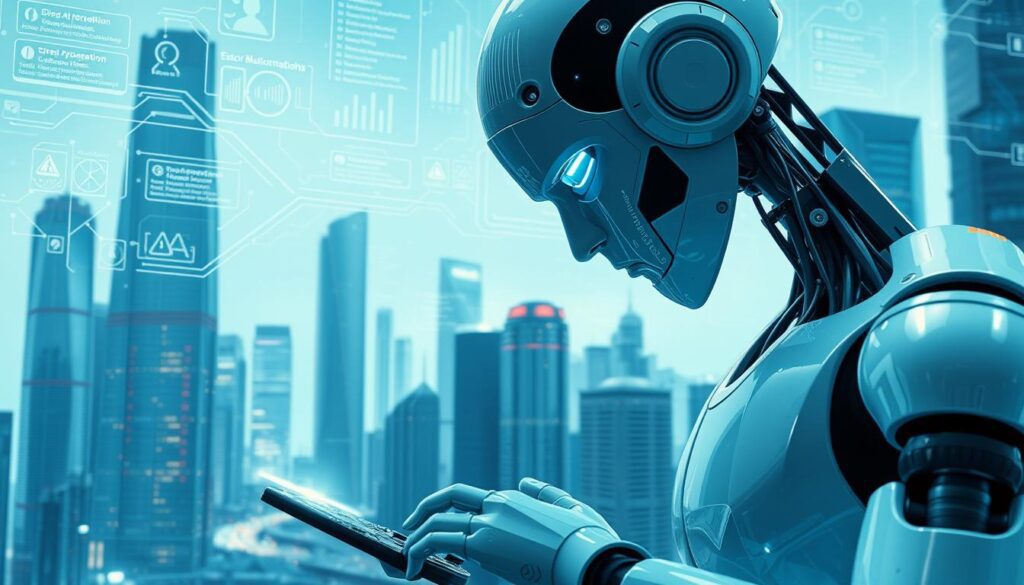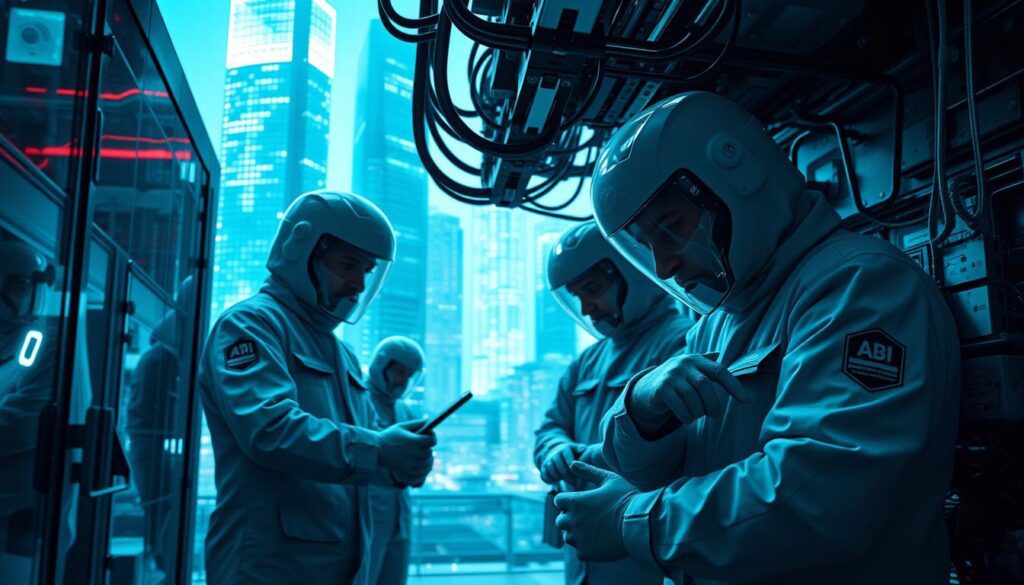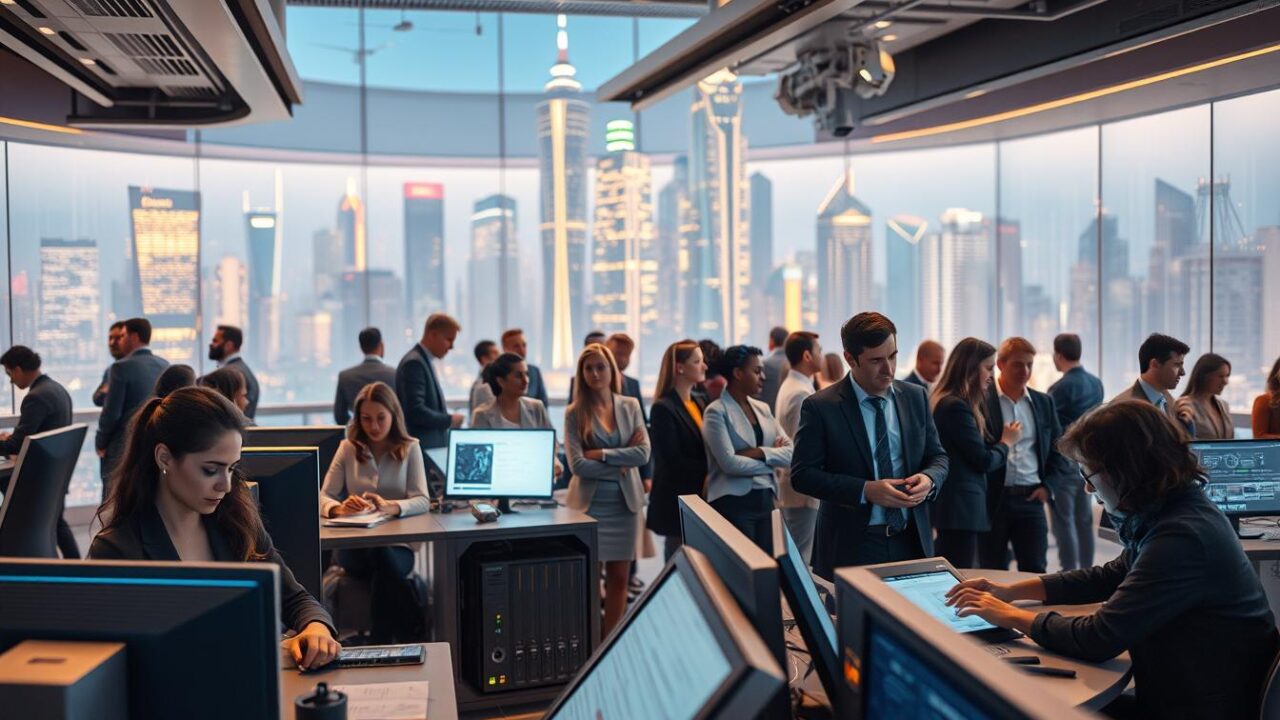What if the very flaws in artificial intelligence systems were creating more jobs than the technology eliminates?
The World Economic Forum says 92 million jobs will disappear by 2025. But, 170 million new roles will appear. This change is not just about replacing jobs. It’s about humans finding new work in the digital world.
70% of top bosses worry about their AI plans. They say they don’t have enough human oversight. The Associated Press uses AI to write 40,000 stories a year. Tech giants also use AI a lot, making it key to fix AI mistakes.
Human-in-the-Loop has become very important. 56% of leaders worry about AI making mistakes or spreading false information. New jobs are popping up, like training AI models and checking for errors.
AI can write code fast, but it needs humans to avoid mistakes. This mix of human skill and AI is changing jobs in many fields. It’s creating new chances for work that we’re just starting to see.
Key Takeaways
- 170 million new jobs will emerge by 2025, surpassing the 92 million positions lost to automation
- 70% of CEOs lack confidence in their AI strategies due to insufficient human oversight AI capabilities
- The Associated Press relies on humans to verify 40,000 AI-generated stories yearly
- 56% of business leaders recognise reputation risks from unchecked AI outputs
- Human-in-the-Loop positions are becoming essential for quality AI deployment
- New careers include AI compliance monitoring, model training supervision, and workflow optimisation
The Rise of AI and Its Imperfect Nature

Artificial intelligence has changed many industries very quickly. But, it shows a big problem in modern tech. AI is great at finding patterns and handling data, but it can’t think like humans do.
This difference between AI’s power and human smarts opens up new chances for working together. This is true in many areas.
Understanding AI Hallucinations and Factual Errors
AI often makes “hallucinations” – things that sound right but aren’t true. These mistakes happen because AI guesses based on patterns, not really understanding what it’s talking about. Kai-Fu Lee, who wrote AI Superpowers, says AI needs human insight to get better.
These errors are not just small mistakes. They can be big misunderstandings of what’s going on.
Why AI Systems Make Mistakes Despite Advanced Technology
Modern AI works by making predictions based on data, not by logical thinking. Some big problems include:
- It can’t get emotional subtleties or understand the context
- It can mimic art styles but doesn’t have real creativity
- It doesn’t really get what it’s saying
- It struggles with making big decisions that need common sense
Recent studies show this gap: 65.7% of medical students learn faster with AI, but 60% of Americans are uneasy with AI in healthcare. This shows we need to make sure AI is reliable in important areas.
The Growing Need for Human Intervention
India’s Apollo Hospitals shows a smart way to use AI. They let technology help with paperwork and finding patterns. But doctors make the final calls. This shows how important it is to have humans check AI’s work.
Even in schools, AI has its limits. It can’t inspire students or manage classrooms like a teacher can. Teachers need to use their emotional smarts to connect with students.
Humans New Jobs Cleaning Up AI Mistakes

Artificial intelligence is changing how we work in many fields. A new trend is the creation of jobs to fix AI’s mistakes. These roles add a layer of human skill to make sure AI works well and meets professional standards.
Content Editors and AI Text Refinement Specialists
The Associated Press uses AI to make 40,000 stories a year. But, human editors check facts and make the writing better. AI can quickly gather info, but it can’t tell stories like humans do. Ai error correction is now a key skill for editors to make AI text interesting.
Content refinement specialists work with AI to:
- Add emotional depth and cultural context
- Keep the brand voice consistent
- Catch small errors in tone and meaning
- Check if statistics and data are correct
Fact-Checkers for AI-Generated Information
Trust is key in digital content. Fact-checkers now focus on checking AI’s work. They make sure AI doesn’t spread false info. They know the tech limits and the subject matter well, keeping information true.
Quality Assurance Roles in AI Development
Companies like NICE use AI for tasks like legal documents and mental health plans. Quality assurance teams test these systems before they’re used. They check for biases, test the limits, and make sure everything meets rules.
These new jobs show AI doesn’t replace human smarts. While machines do routine tasks, people focus on creativity, making decisions, and checking quality. These are things only humans can do well.
The Evolution of Human-AI Collaboration in the Workplace

The workplace is changing fast as artificial intelligence (AI) becomes a big part of our daily work. Now, 77% of companies use or are looking into AI for their work. It’s not about replacing people but about working together with smart systems.
Amazon shows how this change works. They use over 750,000 mobile robots and thousands of robotic arms in their warehouses. This has cut their order fulfilment costs by 25% while keeping humans in key roles. People now focus on checking quality, improving systems, and handling tricky situations that need human insight.
The finance sector is also changing, spending £28 billion on AI in 2023. Banks alone spent £17 billion on AI. AI is great at looking through lots of data and spotting fraud. But, it needs humans for ai auditing and making tough decisions. New jobs are coming up where people oversee these systems, making sure everything is right and fair.
Banks are a good example of adapting to change. When ATMs came out, many thought bank tellers would disappear. But banks changed, using machines for simple tasks and keeping staff for important work. Today, experts in data curation for ai help train AI to serve customers better while keeping the human touch for complex questions.
Research by Anthropic shows AI can do 43% of current jobs. But this means workers can learn new skills and take on more important tasks. The best opportunities are for those who learn to work with technology and keep doing what only humans can do.
AI Error Correction as a Growing Professional Field
The fast growth of artificial intelligence has opened up a new world of work. As more companies use AI, the need for experts in ai error correction has grown a lot. Today, over half of employers want their staff to know about AI. They know that machines can’t always be right or fair on their own.
Skills Required for AI Error Detection
To do well in ai quality assurance, you need both tech skills and a human touch. Being able to think critically is key. You have to spot things that AI might miss. Career expert Miriam Groom says that being able to make connections and understand complex information is what makes humans unique.
Being good with people is also very important. You need to work well with tech teams and people who depend on AI to get things right.
Training Programmes for AI Quality Control
There are now special courses to learn about AI. Coursera has AI for Digital Marketing, and Udemy has AI for Coders. LinkedIn Learning and edX also offer courses like Machine Learning for Finance and AI in Business Strategy. These courses are a great start for a career in human oversight ai.
Career Pathways in AI Oversight
The field offers many different paths:
- AI model training specialists
- Prompt engineers
- AI ethics oversight officers
- Human-AI collaboration strategists
- AI compliance professionals
McLean and Co.’s 2025 Trends Report shows that training leaders in AI oversight is now HR’s main focus. It’s more important than usual recruitment worries.
Data Curation and AI Training Supervision
The growth of AI has led to new jobs focused on data curation for ai. These experts check the quality of data for AI models. They make sure the information is accurate and relevant.
Amazon’s 750,000 robots need constant updates to work well. Behind them are teams of curators. They review and organise data for AI. Their work helps keep AI outputs fair and accurate.
- Identifying and removing mislabelled information that could corrupt AI learning
- Ensuring compliance with privacy regulations, particular in healthcare applications
- Verifying accuracy standards for financial and legal sector implementations
- Monitoring AI learning processes to prevent harmful bias development
The financial sector has spent £28 billion on AI. This has created a big need for experts in ethical ai governance. These curators link AI’s power to real-world needs.
Data curators need special skills. They must be tech-savvy and know their domain well. They check AI’s development against values and rules. Their work stops errors that could harm reputations or break rules.
The Economic Impact of AI-Related Employment Creation
The AI revolution is not just about machines taking jobs. It’s creating a new economy where human-AI collaboration thrives. The World Economic Forum predicts a net gain of 78 million jobs in the next five years. At the same time, 92 million traditional jobs will disappear.
This change shows AI is making new careers faster than it’s taking old ones. This is true, mainly in roles that check quality and oversee work.
Job Market Transformation in Developed Countries
The change is happening fast in developed countries. In America, 86% of business leaders want to use AI for entry-level jobs. Almost a third plan to do this in just a year.
This fast pace means there’s a big need for experts in ai quality assurance and overseeing systems.
Financial services are leading this change with £28 billion in AI investments. This has created thousands of jobs in compliance and oversight. Amazon’s story is a good example. They cut costs by 25% with automation but also created new jobs in robot care and AI supervision.
Employment Statistics in AI Support Roles
The numbers are impressive. Sectors using AI are seeing growth in support roles. These humans new jobs cleaning up ai mistakes include prompt engineers and experts checking AI decisions in healthcare and finance.
Wage Growth in AI Quality Assurance Positions
Wages show how important these roles are. AI oversight jobs pay well, with the fastest wage growth for those needing both tech skills and human insight. The best workers are not fighting AI but improving their careers with it.
Ethical AI Governance and Human Oversight Requirements
Artificial intelligence is moving fast, and governments are trying to keep up. Leaders like Elon Musk say we need rules to avoid big problems. We need experts to make sure AI is used safely and wisely.
Regulatory Frameworks Demanding Human Supervision
Big countries are making rules for ai accountability. The European Union’s AI Act requires checks and openness in key areas. China and India also have rules for AI use, focusing on fairness and data safety.
These rules all say the same thing: humans must make the final decisions. In finance, health, and justice, AI can help but humans must agree on big choices.
Corporate Responsibility in AI Deployment
Companies are learning that being ethical with AI is more than just following rules. They need special officers to watch for unfair AI use. These officers check for bias, make sure decisions are clear, and keep things fair.
- Regular AI audits and performance assessments
- Clear responsibility matrices (RACI) for AI decisions
- AI Governance Committees overseeing deployment
- Transparent reporting mechanisms for AI-related incidents
Smart companies know AI is great for simple tasks but not for everything. They mix AI’s speed with human insight. This way, services are both efficient and truly human.
White-Collar Workers and the AI Revolution
The world of work is changing fast. AI can now look through legal documents in seconds, saving weeks of time for lawyers. Financial experts use AI to predict market trends with great accuracy. And, software developers see AI write code almost as fast as they can.
But this change also brings new chances. Research shows that while AI might replace some jobs, it also creates new ones. The key is to adapt.
- Solicitors focus on complex litigation whilst AI handles routine contract reviews
- Financial advisers provide strategic insight whilst algorithms crunch data
- Marketing specialists craft brand vision whilst AI generates initial content drafts
- Software engineers solve creative problems whilst AI writes boilerplate code
To thrive, we must learn to work with AI, not against it. Those who improve at ai error correction and oversight become more important. Those who don’t risk being left behind by colleagues who can work with AI.
The message is clear: adaptability is now key to job security. White-collar workers need to move from doing tasks to overseeing AI, ensuring quality, and making big decisions.
Industry-Specific AI Auditing and Accountability Roles
Artificial intelligence is changing many sectors, each with its own challenges. Experts are needed who know both their field and ai auditing. They help link new tech with specific industry needs, creating key humans new jobs cleaning up ai mistakes in various fields.
Healthcare AI Verification Specialists
Healthcare giants like Apollo Hospitals use verification specialists. They check if medical AI systems are safe. These experts compare AI diagnoses with human medical knowledge, ensuring accuracy in imaging and records.
They have medical training and know AI well. This lets them find errors that could harm patients. They review X-rays, MRI scans, and patient data to ensure doctors make safe decisions.
Financial Services AI Compliance Officers
The financial sector has invested £28 billion in AI. It needs compliance officers who know both rules and AI algorithms. These officers check AI for bias in credit scoring and investment advice.
They make sure ai accountability by reviewing lending algorithms for fairness. They also watch fraud detection systems. Their work stops unfair practices and keeps rules in check across different places.
Legal Sector AI Review Professionals
Legal firms use AI for drafting contracts and document analysis. They need review professionals to check these documents. These specialists ensure legal documents are correct, following all rules and standards.
Law firms making legal AI tools need lawyers to check their work. This ensures contracts are legally sound and follow all legal rules.
Future Prospects for Human Employment in the AI Era
The future workplace is full of new chances for those ready to change. AI is changing old jobs, but new ones are also coming. These new jobs need skills that machines can’t do, like creative work and human oversight.
Emerging Roles We Cannot Yet Imagine
Jobs that need hands-on skills are hard for AI to take over. Robots can walk and jump, but they can’t fix pipes or wire houses. Electricians, plumbers, and mechanics have skills that AI can’t match.
As AI gets better, new jobs will come up. These jobs will need both technical skills and human judgement.
Vancouver career coach Vida Thomson says we should think differently about jobs: “Think about the efficiency AI creates to support company growth.” Now, new workers can learn quickly and think strategically. AI helps with routine tasks, making room for growth and advancement.
Skills Development for Tomorrow’s AI-Related Jobs
Lisa Highfield from McLean and Company notes companies are investing in their people. They look for leaders who can adapt and build relationships. Resources like Import AI by Jack Clark and The Algorithm from MIT Technology Review help with learning.
Professional groups also offer chances to network and learn.
- Continuous learning mindset essential for success
- Data curation for ai skills increasingly valuable
- Human oversight ai positions expanding across industries
- Strategic thinking prioritised over routine tasks
Those who see AI as a chance will do well. The future workplace values both technical skills and human abilities.
Conclusion
The way we work is changing fast. AI is making new jobs and not just taking old ones. The World Economic Forum says 170 million new jobs will come, while 92 million will go. This shows how important it is for humans to clean up AI mistakes in our economy.
New jobs are popping up everywhere because of AI. In healthcare, people check AI diagnoses. In finance, they watch over AI trading. Legal firms need people to check AI contracts. These jobs show we need humans to make sure AI works right.
We must keep learning and adapting to work with AI. We need to get better at thinking, feeling, and solving problems. Companies know this, with 70% of CEOs saying they need more humans in their AI plans. AI recruitment trends show organisations are looking for people who can work with AI well.
Instead of worrying about being replaced, we should aim to be unique. AI’s mistakes are creating new chances for humans. Success goes to those who keep learning, adapting, and working with AI. The future workplace needs both AI and human smarts.
Want to hire me as a Consultant? Head to Channel as a Service and book a meeting.

